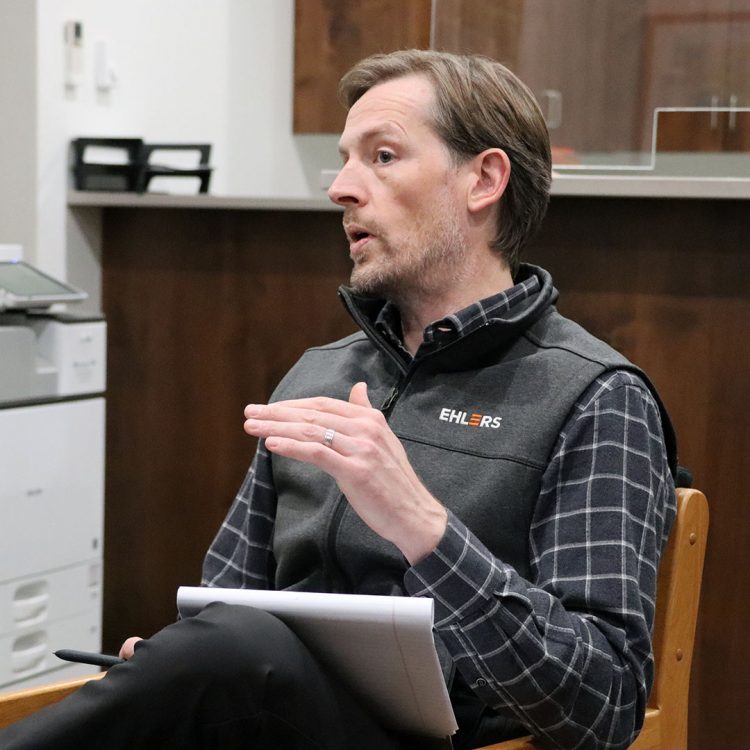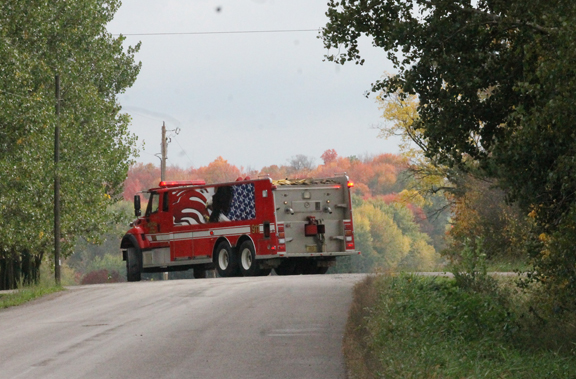Cadott Village Board - Sewer rates have to go up to stay afloat


Brian Reilly, with Ehlers, spoke about the need for a sewer rate increase, during Cadott’s Village Board meeting Nov. 20. The system is no longer paying for itself, requiring an increase for users. Photo by Ginna Young
By Ginna Young
Having a working sewer system is essential to running a municipality, but that system also has to be profitable. Cadott’s? No so much.
The matter was discussed Nov. 20, at the regular village meeting, with representatives from Ehlers sharing information about the overall fiscal position of the municipality. One issue that was identified, was with the sewer utility.
Over the last few years for sure, expenses had to be covered by the General Fund. A sewer should be set up to pay for itself and not take from the General Fund, which causes stress in other needed areas.
“All the bills are getting paid, but the Sewer Utility Enterprise Fund is not generating enough cash to pay everything,” said Brian Reilly, with Ehlers.
Cadott’s ordinance specifies calculations and rate recommendations. Since that is the case, Ehlers performed a costs-to-service rate study, as dictated by ordinance. In that study, Ehlers looked at the functions of the utility, as opposed to the user classes, to make sure the system cost is fairly allocated to the users.
As it is set up, the base or fixed charge is in place, along with volume metric charges, per 1,000 gallons. However, that base charge is too low, which needs to be increased more significantly than the user rate.
Currently, the base charge is $16, but would be raised to $20.62.
“The base charge is increasing almost 29 percent, compared to the volume charge going up 10 percent,” said Kristina Norquist, Ehlers.
By doing so, it would create a 16.55 percent increase revenue for the sewer system.
April Bruhn, village clerk, did some quick math and discovered that a normal user’s rate bill would only go up about $6 a month.
“If you think about the utility as a business…you have certain fixed costs and those present risks, just like any other business,” said Reilly. “You got things you have to do. This should better align revenues and expenses.”
The rates will take effect for the billing period after Jan. 1, 2024. None of the board members were in favor of raising the rates, but agreed it has to be done, so they started the ball rolling to increase the rates.
“How do we avoid this in the future?” asked trustee Les Liptak.
Norquist said it would be good to review the sewer revenues in two to three years. That way, if another increase is needed, it won’t be such a hit all at once to pocketbooks.
“We don’t want to have this happen to us again,” said village president Randy Kuehni. “We want this to not be such a big shock to our constituents here.”
Also going up, are the recycling charges that are on the utility bills. With the new contract from GFL, the village’s cost for recycling pick-up is$29,322. They do receive a grant to help with that, for $2,619.35, meaning there’s still $26,702.65 remaining to be paid.
Currently, residents see a $2.72 charge on their utility bill, which makes the village responsible for $8,979.13. If the board decided to put the whole cost onto the residents, it would make their charge $4.10, per month.
“I hate to put the whole thing on there,” said trustee Bart Chapek. “They got enough stuff going up.”
Liptak suggested the fee could go up to $3.25, which would raise the residents’ bill 50 cents each month. Eric Weiland, village trustee, felt that while 50 cents may not seem like much, it can all add up.
“There are other people who are less fortunate than some of us sitting here,” said Weiland.
The other trustees acknowledged that to be true, but pointed out that it would only increase the residents’ bills by $6 a year. Weiland agreed that wasn’t terrible and the process will begin to raise the charge.
“We gotta pay bills, too,” said Kuehni. As a reminder, a residential customer is expected to use GFL as their service provider, because the village is contracted with them. Through that contract, the resident can get a better price for the services and while it needs to be looked into, it’s possible the village bylaws state the residents must go with the contracted company.
Another matter that is still being investigated, is about concerns resident/homeowner Joe Barone has about the neighboring business to his property, owned by Bowe Holding. Barone feels the noise coming from the wood business and the dumpsters sitting around, are diminishing the value of their home.
Weiland says he has personally looked into many of the concerns that were brought up. Some concerns, Weiland believes are unfounded, as the business has professionals hired to trap rodents and an inspection proved there are no signs of rotten wood.
“It’s actually pretty clean, for the most part,” said Weiland.
Barone was relieved to hear that and was glad the village is following up on the concerns addressed, but is still questioning if the noise level is violating the village ordinance, as well as a few other issues.
“I’m not saying that he can’t operate his business,” said Barone. “I’m saying it’s your guys’ jobs as elected officials, to enforce these ordinances.”
It was agreed the matter will probably need to go to the Ordinance Committee, with some guidance from the village attorney. Weiland said many people think that their concerns are never addressed, but that is not the case.
“There are a lot of things that get done after complaints, that people don’t even know get accomplished,” he said, adding that there are legal steps to take. “It does get addressed, one way or another.”



